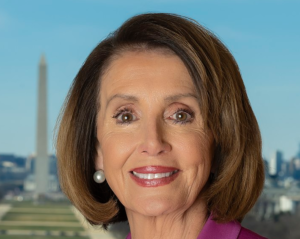Welcome to Atlantic City, Speaker Pelosi
Listen to audio version of this article

In March, 2004, Democratic presidential candidate Sen. John Kerry, asked to explain his vote in favor of an $87 billion appropriation to support wars in Iraq and Afghanistan, replied: “I actually voted in favor of the $87 billion before I voted against it.”
In the way candidates’ remarks are reduced to campaign shorthand, his response became “I was for it before I was against it.”
His candidacy began to crater as critics pounced on it, accusing him of flip-flopping or — worse yet — of a crass attempt to have it both ways, mollifying the hawks in his party while reassuring the doves that, deep down, he shared their outlook.
His “I was for it before I was against it” comment endured for 12 years as perhaps the most damaging utterance by a presidential candidate until supplanted by a smirking Hillary Clinton’s condescending description of Donald Trump supporters as “a basket of deplorables.” (The deplorables had the last laugh.)
As it struggles to develop a coherent message and credible position on bringing articles of impeachment against the president, the House Democratic majority has arrived in Kerry territory — “we’re for it and we’re against it.”

It has fallen to an increasingly harried Speaker Nancy Pelosi – set to give the keynote at next week’s New Jersey Democratic State Committee party in Atlantic City – to thread the needle, reconcile the conflicting understandings of the impeachment process while brokering an armistice between the vocal “impeachment now” crowd and the centrist newcomers who fear the preoccupation with removing the president from office endangers their re-election prospects. Many represent districts carried by Trump in 2016 and worry that if impeachment dominates the 2020 campaigns, their seats will be lost.
Allowing the impeachment issue to overpower issues such as health care, infrastructure, gun control and the economy, for instance, Democrats risk the futures of many freshmen members whose victories forged the party’s House majority in the first place.
A Democratic Congressional Campaign Committee poll supports their concerns, showing that 54 percent of voters believe Congressional Democrats’ primary focus is impeachment but a mere 10 per cent believe it should be.
The confusion surrounding the impeachment movement was exemplified when both Pelosi and her top deputy Steny Hoyer of Maryland appeared to contradict Judiciary Committee Chairman Jerrold Nadler of New York, Pelosi emphasizing that only the House itself can begin impeachment proceedings while Hoyer pointed out that impeachment investigations hadn’t yet begun.
Both points were jarringly and embarrassingly at odds with Nadler’s insistence that his committee has, indeed, begun an impeachment investigation.
It was the Kerry “I was for it before I was against it” principle writ large, contributing to the continued inability of party leaders to deliver a cogent, unified message to the American people on where it stands on arguably the most serious issue facing a democracy — removing a president from office for committing crimes.
The moderates who have urged a more cautious approach believe that turning a sitting president out of office rightfully is the responsibility of voters and, in the absence of clear and convincing evidence of wrongdoing, such an action will feed the perception that the foundation for impeachment is a difference over policies and a personal dislike.
In swing Congressional districts, arguing that disappointment over the results of the 2016 election is sufficient justification for impeachment is a losing proposition.
While more than half the Democratic membership of the House has expressed support for impeachment, that number should be viewed with some skepticism. It is altogether likely many are playing with house money; that is, joining the impeachment chorus to satisfy their district base while secure in the reality that approval of articles of impeachment by the House is problematic and conviction in the Senate is impossible.
It is Pelosi, though, on whom the onus falls. She has thus far kept the torch and pitchfork crowd at bay, insisting that support of the country at large is crucial before impeachment can proceed and that point has not been reached. She has made a point as well that the required 218 votes in the House in favor of impeachment has not been reached, either.
She is a shrewd and masterful political operator and understands what the vocal left fails to grasp or refuses to acknowledge: Forcing a full House vote only to see it fail would be an unmitigated disaster for the Democrats. It would inordinately strengthen Trump, embolden him to reach new heights of Twitter assaults, mock the weakness of his opponents, and dismiss House Democrats as under control of a band of disgruntled radicals.
She has proven adept at holding her caucus together, even though many aren’t even in the same book, much less on the same page. She is certainly willing to permit the Judiciary Committee to continue subpoenaing witnesses and digging around in the mountain of memos and e-mails in search of solid evidence to support a formal impeachment.
At the same time, she’s displayed great sensitivity to the centrists, understanding that preserving and protecting the majority and her continuing to occupy the Speaker’s office relies to a significant extent on their re-election, driven by solid legislative accomplishments rather than by swapping Twitter insults with the President.
She must, however, craft the message. She must strive to unify and bridge the divisions in her party and tell the American people what it stands for.
Channeling John Kerry won’t cut it.
Carl Golden is a senior contributing analyst with the William J. Hughes Center for Public Policy at Stockton University.











Leave a Reply